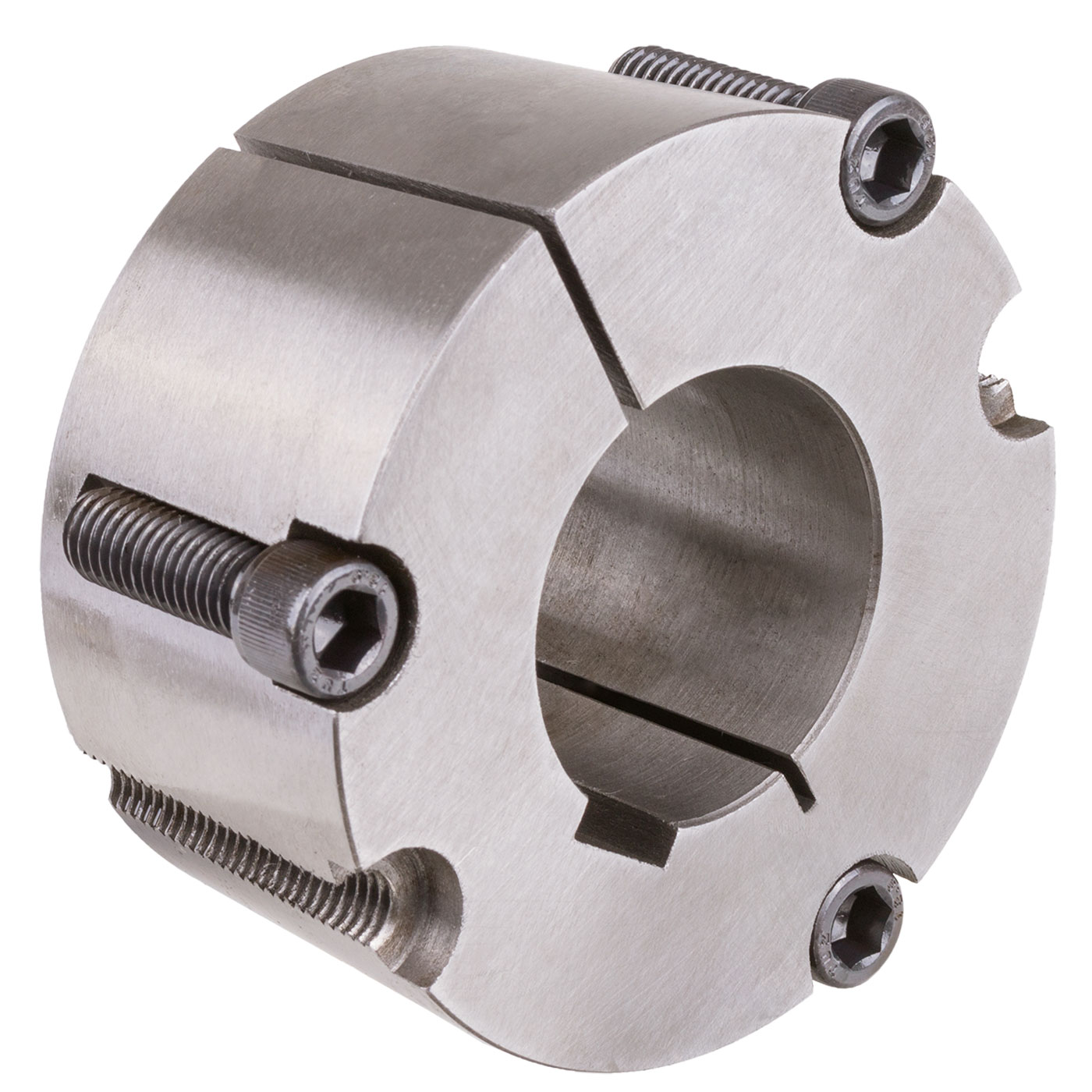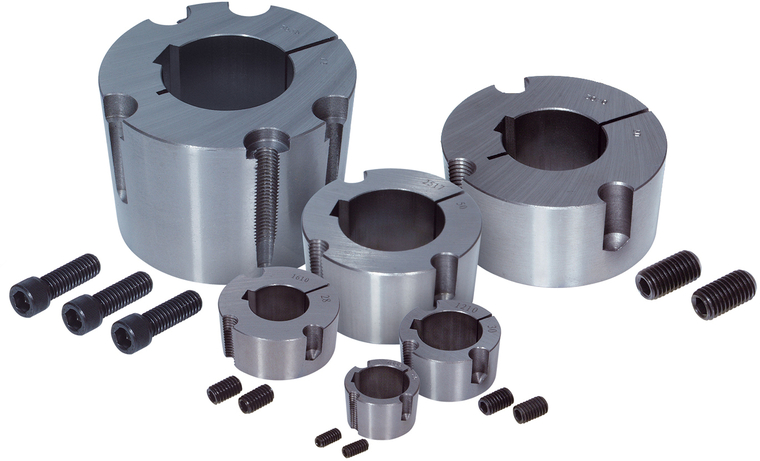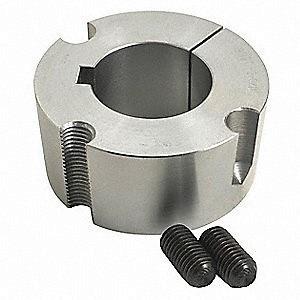Product Description
SC Transmission Taper Bush with Split Bushes for V Belt Pulley
Product Description
Taper bush is the most easy and cost effective way of fixing pulleys, sprockets and couplings to a mating shaft without using any special tools.
Taper bush made from precision cast iron and metal steel, also, can be machined with the required bore and keyway size, always supplied complete with locking set screws, and package with individual box.
Product Parameters
|
Hub Rel |
Bush No. |
A |
B |
C |
D |
E |
h |
|
1210 |
1210 |
73 |
60 |
10 |
25 |
9 |
16 |
|
1215 |
1215 |
76 |
60 |
11 |
38 |
16 |
22 |
|
1610 |
1610 |
83 |
70 |
10 |
25 |
9 |
16 |
|
1615 |
1615 |
83 |
70 |
11 |
38 |
16 |
22 |
|
2012 |
2012 |
96 |
90 |
12 |
32 |
10 |
22 |
|
2517 |
2517 |
127 |
110 |
13 |
45 |
19 |
26 |
|
2525 |
2525 |
152 |
130 |
18 |
51 |
24 |
27 |
|
3571 |
3571 |
152 |
130 |
19 |
76 |
25 |
51 |
|
3030 |
3030 |
184 |
155 |
25 |
65 |
25 |
45 |
|
3535 |
3535 |
184 |
155 |
25 |
89 |
32 |
57 |
|
4040 |
4040 |
225 |
195 |
35 |
102 |
32 |
70 |
|
4545 |
4545 |
254 |
220 |
40 |
114 |
38 |
76 |
|
5050 |
5050 |
276 |
242 |
40 |
127 |
38 |
89 |
Company Profile
FAQ
Shipping
| Material: | 45# Steel |
|---|---|
| Transport Package: | Plywood Case |
| Trademark: | SC TRANSMISSION |
| Origin: | China |
| Samples: |
US$ 10/Piece
1 Piece(Min.Order) | |
|---|
| Customization: |
Available
| Customized Request |
|---|

Can I get recommendations for taper bushes with anti-corrosion properties?
Yes, there are taper bushes available in the market that offer anti-corrosion properties. These taper bushes are specifically designed to resist corrosion and maintain their functionality and performance in corrosive environments. When selecting taper bushes with anti-corrosion properties, consider the following recommendations:
- Stainless Steel Taper Bushes: Stainless steel is a common material choice for taper bushes that require anti-corrosion properties. Stainless steel contains chromium, which forms a protective oxide layer on the surface, providing excellent resistance against corrosion. Taper bushes made from stainless steel are suitable for applications where exposure to moisture, chemicals, or other corrosive elements is expected.
- Corrosion-Resistant Coatings: Some taper bushes undergo specialized coating processes to enhance their corrosion resistance. These coatings can include materials such as zinc, nickel, or other anti-corrosive substances. The coatings act as a barrier between the taper bush material and the corrosive environment, preventing or minimizing the effects of corrosion. Look for taper bushes that specify corrosion-resistant coatings in their product descriptions or consult with manufacturers for suitable options.
- Polymer Taper Bushes: Certain polymer materials, such as high-performance plastics, offer inherent resistance to corrosion and are suitable for applications where anti-corrosion properties are required. Polymer taper bushes can be lightweight, non-metallic alternatives that provide excellent resistance to various corrosive substances, including chemicals and moisture.
- Sealed or Enclosed Taper Bushes: In some cases, taper bushes are designed with additional features such as seals or enclosures to protect against corrosion. These seals or enclosures help prevent corrosive agents from reaching critical components of the taper bush, ensuring its long-term performance and resistance to corrosion. Look for taper bushes with integrated seals or inquire with manufacturers about options for enhanced corrosion protection.
When seeking taper bushes with anti-corrosion properties, it is essential to consider the specific requirements of your application, including the type of corrosive environment, temperature, and other operating conditions. Additionally, consult with taper bush manufacturers, suppliers, or industry experts who can provide recommendations based on their expertise and product knowledge.
By selecting taper bushes with anti-corrosion properties, you can ensure the longevity and reliability of your equipment in corrosive environments, reducing the need for frequent replacements and maintenance.

What are the common materials used in manufacturing taper bushes?
In the manufacturing of taper bushes, several materials are commonly used, each offering different properties and characteristics to meet specific application requirements. Here are some of the common materials used in the manufacturing of taper bushes:
- Steel: Steel is one of the most widely used materials for manufacturing taper bushes. It offers excellent strength, durability, and resistance to wear and corrosion. Different grades of steel, such as carbon steel or alloy steel, may be utilized based on the specific application demands. Steel taper bushes are suitable for a wide range of industrial applications and can handle high loads and harsh operating conditions.
- Stainless Steel: Stainless steel taper bushes are chosen for applications that require enhanced corrosion resistance. Stainless steel contains a higher percentage of chromium, which forms a protective oxide layer on the surface, providing resistance against rust and corrosion. Stainless steel taper bushes are commonly used in environments where exposure to moisture, chemicals, or high humidity is expected.
- Cast Iron: Cast iron is another popular material for manufacturing taper bushes. It is known for its excellent strength, wear resistance, and vibration damping properties. Cast iron taper bushes are suitable for applications where shock absorption and reduced noise levels are desired. They are commonly used in machinery, automotive, and construction industries.
- Aluminum: Aluminum taper bushes offer advantages such as lightweight, good thermal conductivity, and resistance to corrosion. They are typically used in applications where weight reduction is crucial or where non-magnetic properties are required. Aluminum taper bushes are commonly employed in industries such as aerospace, marine, and electronics.
- Brass: Brass is a material that combines excellent machinability with good corrosion resistance. Brass taper bushes are commonly used in applications where aesthetics and appearance are important, such as architectural or decorative installations. They are also suitable for applications involving electrical conductivity, such as in electrical equipment or grounding systems.
- Plastics: Certain engineering plastics, such as nylon or acetal, are used in the manufacturing of taper bushes. These plastics offer advantages like low friction, self-lubrication, and resistance to chemicals and moisture. Plastic taper bushes are often employed in applications where noise reduction, lightweight construction, or non-magnetic properties are required. They are commonly found in industries such as food processing, packaging, or medical equipment.
The choice of material for taper bushes depends on various factors, including the application environment, load requirements, desired performance characteristics, and cost considerations. It’s important to select a material that provides the necessary strength, durability, and compatibility with other components in the power transmission system.
When seeking taper bushes, it’s advisable to consult with manufacturers, suppliers, or industry experts who can provide guidance on the most suitable material based on your specific application needs and operational requirements.

Are there different types of taper bushes, and how do they differ in applications?
Yes, there are different types of taper bushes available, and they can vary in design and application. The variations in taper bush types are primarily based on the specific requirements of different industrial applications. Here are some common types of taper bushes and how they differ in their applications:
- Standard Taper Bushes: Standard taper bushes are the most commonly used type. They feature a standard taper angle and are widely available in various sizes and materials. These bushes are suitable for general industrial applications where a secure connection and ease of installation are required. Standard taper bushes provide a reliable and cost-effective solution for connecting rotating shafts to mating components such as pulleys, sprockets, or gears.
- QD (Quick Detachable) Taper Bushes: QD taper bushes are designed for applications where frequent removal or replacement of the bushing is necessary. They feature a split design with a flange on one end, allowing for quick and easy installation and removal without the need to disassemble other components. QD taper bushes are commonly used in applications where maintenance or component replacement needs to be done swiftly, such as conveyor systems or machinery that requires frequent adjustments or repairs.
- Weld-On Taper Bushes: Weld-on taper bushes are specifically designed for applications where a permanent and rigid connection is required. These bushes have a flange with holes that allow for welding onto the mating component, creating a strong and fixed connection. Weld-on taper bushes are commonly used in heavy-duty applications where there is a need for reliable power transmission and resistance to axial movement or vibration.
- XT (Extra Torque) Taper Bushes: XT taper bushes are engineered to handle higher torque loads compared to standard taper bushes. They feature a larger taper angle and a unique design that provides increased surface contact between the bush and the mating component. XT taper bushes are suitable for applications where higher torque transmission is required, such as heavy machinery or industrial power transmission systems.
- Threaded Taper Bushes: Threaded taper bushes are designed with internal threads in the bore, allowing for direct attachment of threaded shafts or components. These bushes eliminate the need for additional fasteners and provide a secure threaded connection. Threaded taper bushes are commonly used in applications where a threaded connection is preferred or required, such as adjusting mechanisms or equipment that undergoes frequent assembly and disassembly.
It’s important to select the appropriate type of taper bush based on the specific requirements of your application. Consider factors such as load capacity, torque requirements, ease of installation, maintenance needs, and compatibility with mating components when choosing the right taper bush for your industrial equipment.
Consulting with manufacturers, suppliers, or industry experts can provide valuable guidance in selecting the most suitable taper bush type for your application. They can help assess your specific needs and recommend the appropriate taper bush that offers optimal performance and reliability in your intended application.


editor by CX 2023-11-03